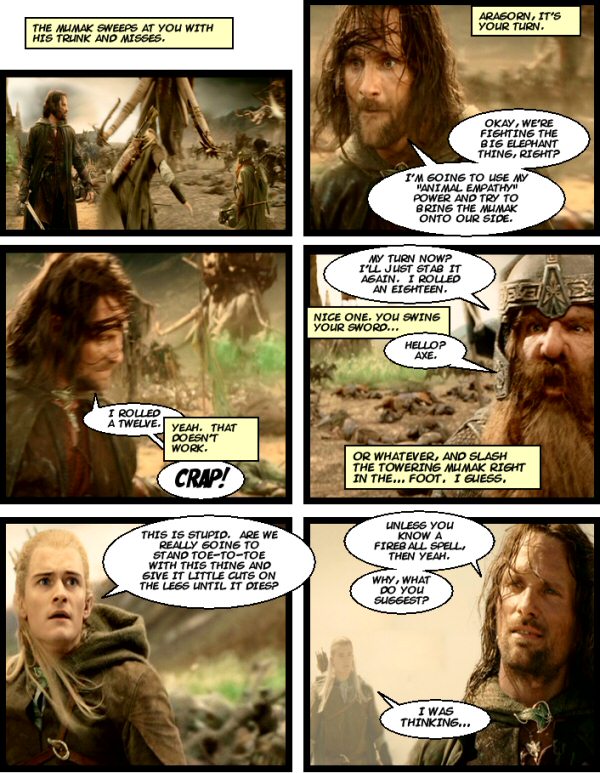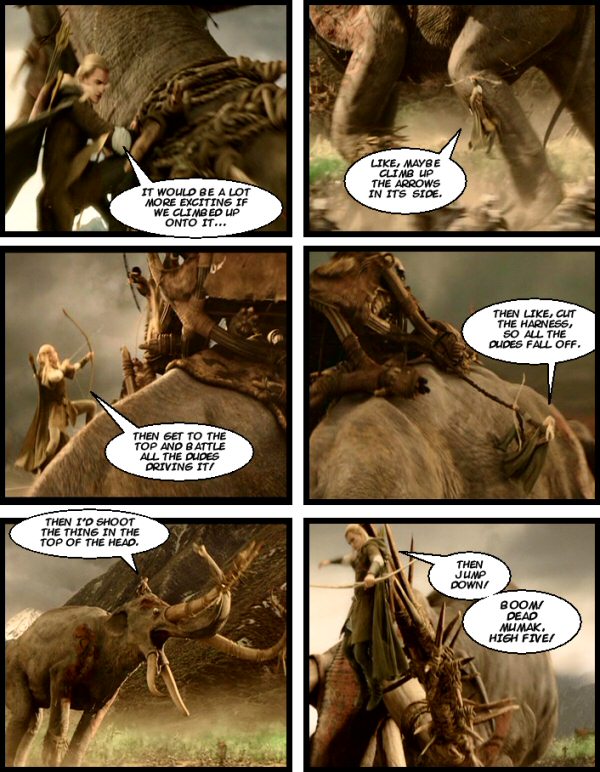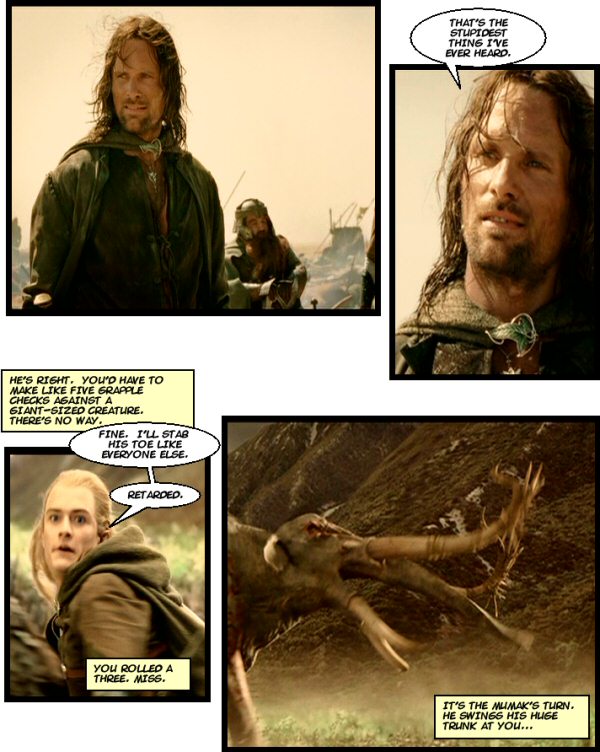raniE
Big Bearded Guy
- Joined
- Feb 10, 2019
- Messages
- 1,988
- Reaction score
- 4,304
Spun off from a comment in this thread about abstractions, I thought I'd start a separate thread about it as this goes way beyond just animal stats in games. We'll start with the comment that inspired me to write this.
Okay, so I think we can all agree that games are imperfect abstractions of the real world. No set of game rules can hope to entirely accurately model the real world, partly because anything even approaching that level of detail would be unmanageable, and partly because we don't actually understand how the real world works (if we did there wouldn't be a disconnect between quantum mechanics and general relativity).
So, what we do have are sets of rules of varying complexity that all try to model something. But what is it they try to model? And how can we tell if they're successful?
Now I'll illustrate this with an example from a different kind of game, grand strategy computer games. I like Paradox Interactive grand strategy games. One of my favorites is Crusader Kings 2, where you play as a dynasty somewhere in Europe, North Africa or Asia as far east as India in a time period from the mid 700s to the mid 1400s. One of the most common starting dates (and the default and earliest starting date if you do not have any expansions) is 1066. When playing from this start date, inevitably one of the first things that happens is that the Holy Roman Emperor declares war on France over the parts of Flanders that France controls but the Emperor thinks should lie under his jurisdiction, crushes France's military fairly swiftly and thus takes these lands. After this loss, France almost inevitably falls apart into various constituent parts, usually the Kingdom of France and the Kingdom of Aquitane, and thus loses most prominence. Because of how the game works, this is a perfectly reasonable outcome. As a model of how the world worked, it is a terrible outcome. It didn't happen in reality, and in an alternate history game, things which diverge from reality should, in my opinion, usually be less likely to occur than things which did happen. Thus, this kind of outcome would be reasonable to see in one game, but not in virtually all games in which you do not play as the ruling dynasty of France.
In my mind, most RPGs aim for some sort of realism, or verisimilitude at least. Not in that everything functions like the real world and the rules are super detailed to get as many finicky bits modeled correctly, but in the sense that everything not called out as such (magic, monsters, super advanced technology, etc) should generally work how the real world works. This is so the players can better immerse themselves in the game and be able to make decisions based on what is happening in the fiction, rather than only what the game rules say. As long as the rules of the game generally generates outcomes that fit this type of verisimilitude, the level of abstraction doesn't really matter for the purposes of realism.
Now sometimes parts of games aim for something other than emulating the real world. Many games make combat far more survivable for the PCs for instance. But that is then usually called out as the game being more of a heroic fantasy or whatnot. I still maintain that all the other parts of the rules should generate outcomes equivalent to the real world or it becomes impossible to immerse yourself in the game world and to make decisions based on what is happening in the game.
So for the example at hand, since unarmed adult humans generally, but not always, beat adult wolves in a straight up fight (if you want to talk specifically about animals, I recommend the thread I linked at the top), this should be reflected in the outcomes created by the rules. As long as that's true it doesn't really matter if the wolf has half a page of stats or simply "Wolf-10".
Games are imperfect abstractions. Water (checks notes) also remains wet.
I can't recall a game which effectively models a sabre-toothed 'cat,' frex. Those honkin' canines may have served a very specialized purpose, to damage large blood vessels in their prey's soft tissue at the neck or belly; they suggest that a sabretooth's strategy was to induce massive blood-loss with a single bite, not to rip its prey to pieces. This goes back to the idea of risks to predators: biting once then waiting for your prey to die from exsanguination is less likely to result in injury than, say, grabbing it by the throat and holding on in order to asphyxiate it, or trying to break the bones of the neck. This is particularly true in the case of the sabretooth as those big canines could break against bone, making it harder to hunt effectively and putting the animal at risk of a deadly infection.
If we're modeling that correctly, the sabretooth should cause damage from its bite, then there should be a significant chance of the wound continuing to bleed, round after round, while the cat stalks the dying victim. I can't recall a game which does that.
The best thing, in my opinion, is to offer guidance to referees on behavior, not just the 'rawrr!' numbers.
Okay, so I think we can all agree that games are imperfect abstractions of the real world. No set of game rules can hope to entirely accurately model the real world, partly because anything even approaching that level of detail would be unmanageable, and partly because we don't actually understand how the real world works (if we did there wouldn't be a disconnect between quantum mechanics and general relativity).
So, what we do have are sets of rules of varying complexity that all try to model something. But what is it they try to model? And how can we tell if they're successful?
Now I'll illustrate this with an example from a different kind of game, grand strategy computer games. I like Paradox Interactive grand strategy games. One of my favorites is Crusader Kings 2, where you play as a dynasty somewhere in Europe, North Africa or Asia as far east as India in a time period from the mid 700s to the mid 1400s. One of the most common starting dates (and the default and earliest starting date if you do not have any expansions) is 1066. When playing from this start date, inevitably one of the first things that happens is that the Holy Roman Emperor declares war on France over the parts of Flanders that France controls but the Emperor thinks should lie under his jurisdiction, crushes France's military fairly swiftly and thus takes these lands. After this loss, France almost inevitably falls apart into various constituent parts, usually the Kingdom of France and the Kingdom of Aquitane, and thus loses most prominence. Because of how the game works, this is a perfectly reasonable outcome. As a model of how the world worked, it is a terrible outcome. It didn't happen in reality, and in an alternate history game, things which diverge from reality should, in my opinion, usually be less likely to occur than things which did happen. Thus, this kind of outcome would be reasonable to see in one game, but not in virtually all games in which you do not play as the ruling dynasty of France.
In my mind, most RPGs aim for some sort of realism, or verisimilitude at least. Not in that everything functions like the real world and the rules are super detailed to get as many finicky bits modeled correctly, but in the sense that everything not called out as such (magic, monsters, super advanced technology, etc) should generally work how the real world works. This is so the players can better immerse themselves in the game and be able to make decisions based on what is happening in the fiction, rather than only what the game rules say. As long as the rules of the game generally generates outcomes that fit this type of verisimilitude, the level of abstraction doesn't really matter for the purposes of realism.
Now sometimes parts of games aim for something other than emulating the real world. Many games make combat far more survivable for the PCs for instance. But that is then usually called out as the game being more of a heroic fantasy or whatnot. I still maintain that all the other parts of the rules should generate outcomes equivalent to the real world or it becomes impossible to immerse yourself in the game world and to make decisions based on what is happening in the game.
So for the example at hand, since unarmed adult humans generally, but not always, beat adult wolves in a straight up fight (if you want to talk specifically about animals, I recommend the thread I linked at the top), this should be reflected in the outcomes created by the rules. As long as that's true it doesn't really matter if the wolf has half a page of stats or simply "Wolf-10".









 (which is not about high blood sugar...)
(which is not about high blood sugar...)
